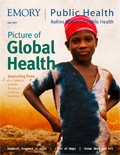Center targets cardiometabolic diseases

K.M. Venkat Narayan
Worldwide, more people in developing countries die of cardiovascular disease and diabetes than malaria, HIV, and tuberculosis combined.
|
In Brief |
Emory and the Public Health Foundation of India (PHFI) lead a new effort targeting this group of costly, chronic, and potentially debilitating diseases.
The Global Center of Excellence for Prevention and Control of Cardiometabolic Diseases in South Asia will be based at PHFI in New Delhi. Researchers there and at Emory will study the burden and risk factors for cardiovascular disease and diabetes in India and Pakistan and develop intervention strategies for prevention and control. Faculty also will train young scientists in both countries in cardiovascular epidemiology research.
The center is one of nine similar centers funded by the National Heart, Lung, and Blood Institute. Additional funds from the Ovations Chronic Disease Initiative of the UnitedHealth Group will support the PHFI/Emory center.
To begin their studies, researchers will establish three surveillance cohorts in New Delhi and Chennai, India, and in Karachi, Pakistan, to survey 4,000 people in each city for heart disease and its risk factors. Investigators will follow them over time to determine the rate and predictors of developing heart disease.
In another study, researchers will recruit 1,200 people living with diabetes in eight locations in India and Pakistan to test the effectiveness of various diabetes and heart disease treatment and care-delivery strategies.
The strategies behind the center’s research are twofold, says K.M. Venkat Narayan, Ruth and O.C. Hubert Professor of Global Health and Epidemiology and U.S. lead investigator. "First, we want to understand the occurrence and burdens associated with heart disease and diabetes to identify those who are at high risk for these conditions. Second, once someone develops diabetes, we want to control the disease and prevent its severe and ofen life-threatening complications."
Narayan and Dorairaj Prabhakaran, PHFI lead investigator, know the disease statistics well. India, Pakistan, and Bangladesh are among the top 10 countries in the world with the most diabetes cases. South Asia has the highest number of diabetes-related deaths in a region, and Asian Indians are projected to account for 40% to 60% of the global cardiovascular disease burden over the next 10 to 15 years. In India, 35% of cardiovascular disease-related deaths occur in people ages 35 to 64. In the United States, the rate for the same age group is 12%.


